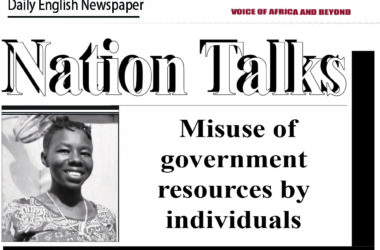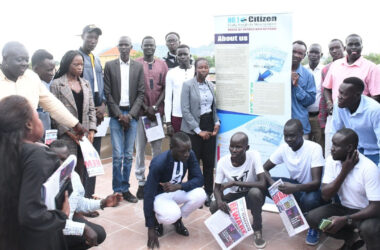By Malek Arol Dhieu
It may be convincing at first to clarify that I do not actually mean the real tree, but the current look of South Sudan as a tree, as a big shady tree that has sheltered each and every individual of the 64 tribes of South Sudan.
Trees shed during shedding periods so as to grow younger and healthier leaves to withstand the harsh conditions of the environment until the next shedding period, and the cycle continues, South Sudan, with the pale yellow leaves of the two senseless wars, shed in 2018 and expected to grow younger and healthier leaves to become much shadier to restore its original look, but up to now, not even a branch is seen showing an outgrowth of leaves. The greener the leaves, the healthier the roots, i.e. any leafless tree must have its roots diseased.
The signing of the Revitalized peace agreement came at the right time, at the time when an internal war is to be fought, at the time when warmongers from both sides needed to breath, at the time when tools (people) used for fighting had realized they were fighting an unjust war, and at the time when peace mediation was expected to be called by one side and the other side expected it to be called by the other side.
From there, mediators’ intervention was needed to bring the two warring parties together to sign peace if they agree. All went well, though some were debated and if seen like it could take people back to the bush, then they were compromised, until the peace was achieved.
The commitment seen from both sides instilled a belief in people that this peace agreement will not easily be dishonored but the implementation is easier said than done, moving more slowly than expected. A lot of clashes and killings are happening on daily basis, but because both authorities are handcuffed by the implementation process, such killings go unaddressed and the only resort is to condemn them wherever they happen, and if people are to ask, how will these problems be addressed later when they are counting?
I know solving them later or even their availability now contributes further to abrading the healing wounds of wars. People at the grass roots are faced by numerous challenges; among them are shortages of food, medical services, scholastic materials, and poor infrastructure, famine, drought, flooding among others.
Natural disasters have, on the other hand, found space and interposed themselves to cause more human sufferings, therefore contributing to the delay of the implementation process by dividing the attention of the implementers to focus on two (or more) directions instead of focusing on only one direction, i.e. the direction of implementation of peace agreement.
It now looks like, when the peace agreement is fully implemented later, there would be no more people to service at the grass roots, which will lessen the meaning of the peace agreement and blackspot it. The only places to migrate to now for assistances are Juba as a city and state headquarters which still look leafy and oily, but how long will these limited resources be shared like that when their channels are even narrowing and their owners have learnt to consume without leftovers for starving citizens.
The roots of the Republic of South Sudan, I mean the communities, I again mean the people whose towns were taken closer to, are drying and diminishing in function, making the tree counting down its days of survival. The implementers, who think they are on extreme top of the tree, will fall or dry together with the roots since the survival of the tree largely depends on the roots. As the article concludes, I want to strengthen the hearts of the citizens that however long the night is, there is always a new dawn with hopes, joy and plethora of new things that would make one forget the past sufferings. Moreover, the last days of the sufferings are always painful and memorable, and because of that, perseverance needs not to be abandoned, the day is nearing, I tell you the day is nearing. It’s only one more push to call it a peaceful South Sudan. Wear hope, I repeat wear hope!
The author is a medical student, University of Juba.
Latest Stories
- 15 hours ago
- Juba Modern Shopping Mall construction resumes
- 15 hours ago
- Country-driven research MoU signed
- 16 hours ago
- World Bank funds climate-smart farming in South Sudan
- 16 hours ago
- Jebel Lado residents appeal for urgent aid as floods hit
- 16 hours ago
- SPLA-IO condemns attack on its position in Jonglei State



